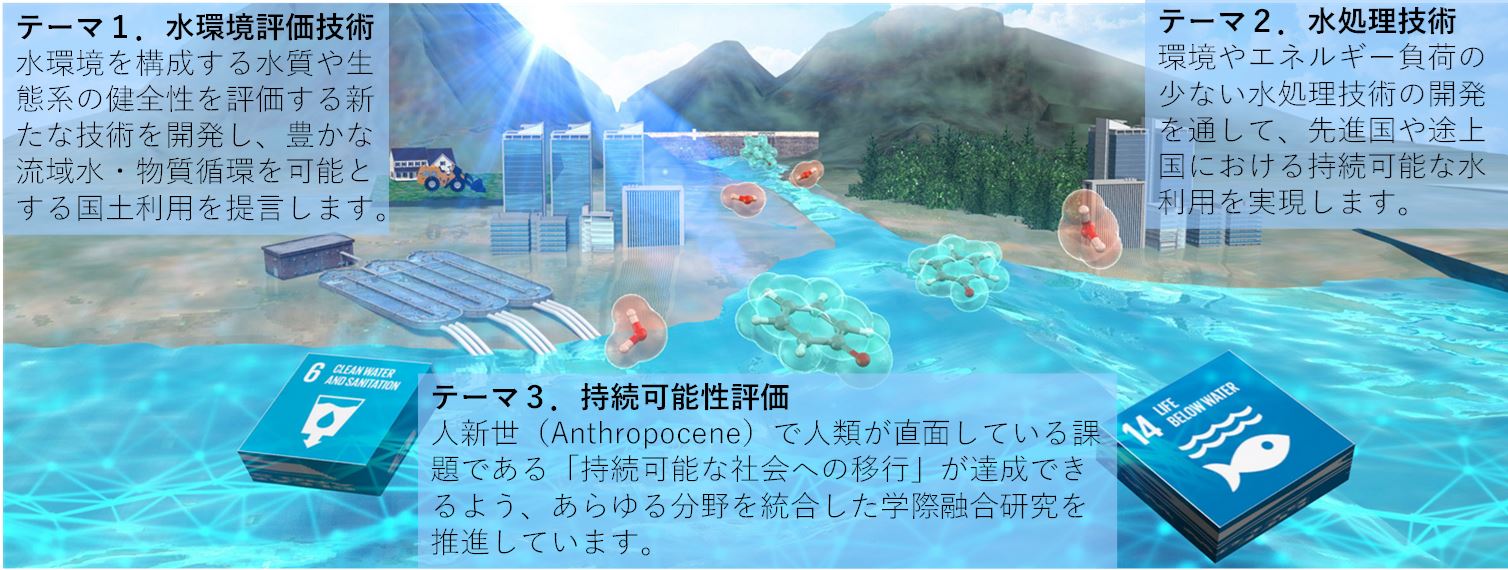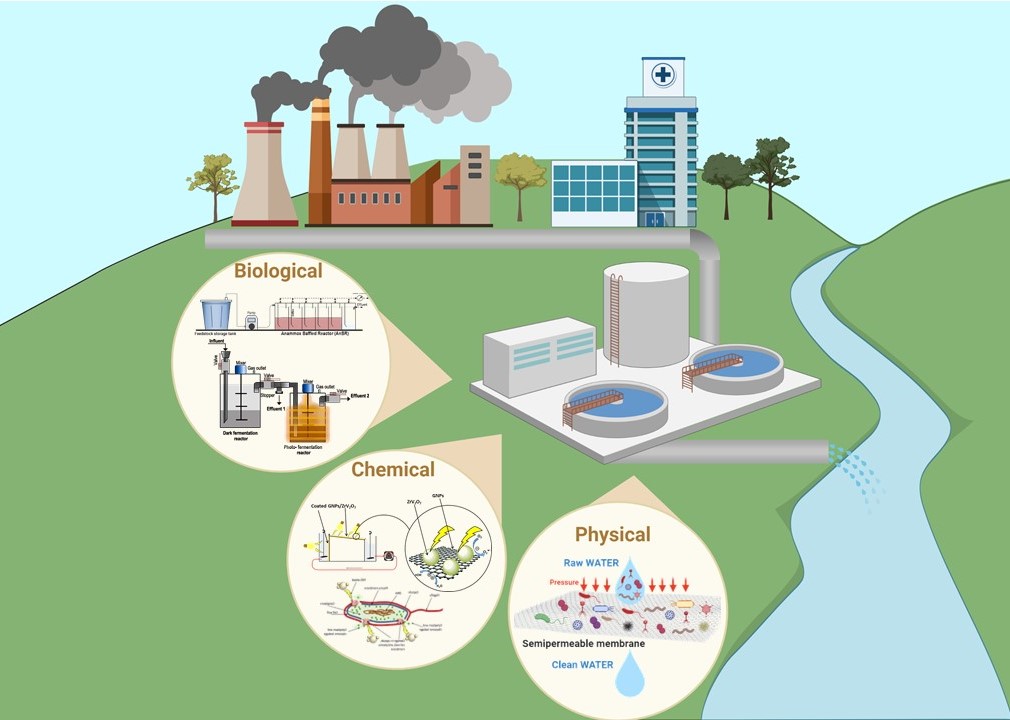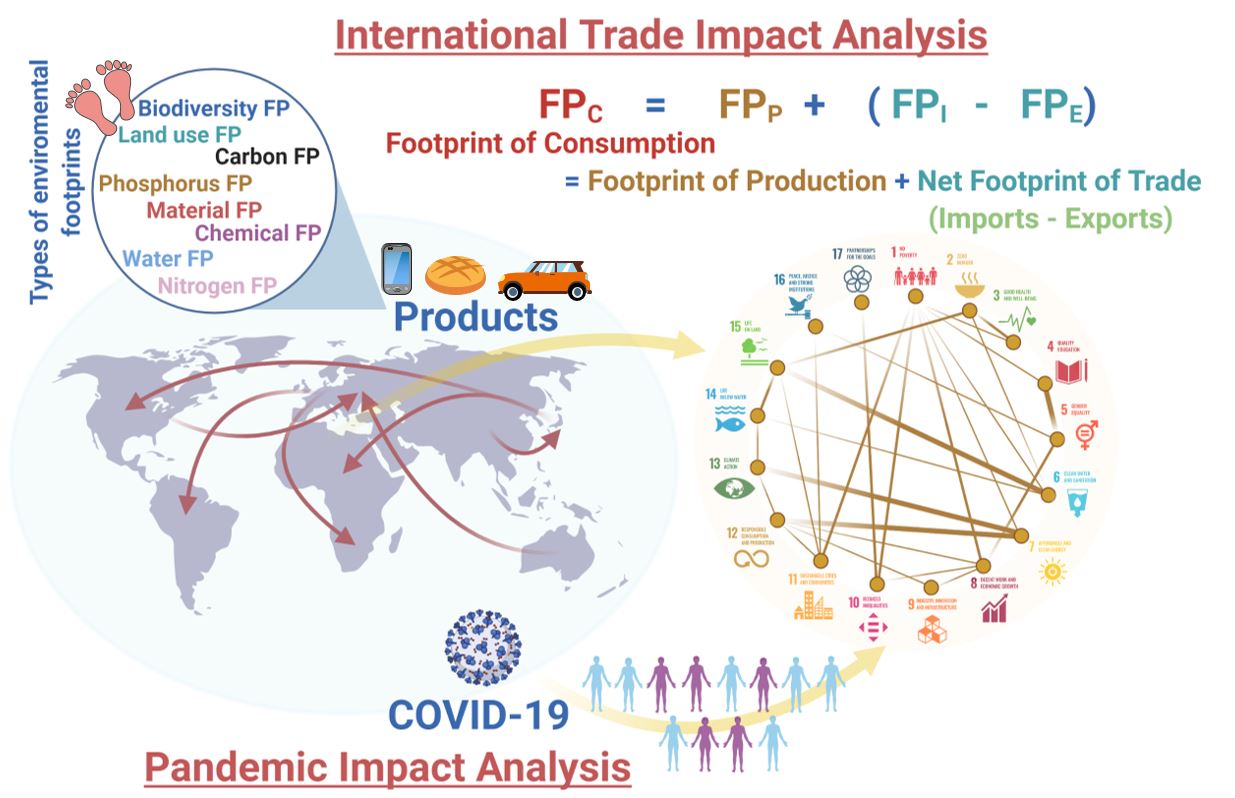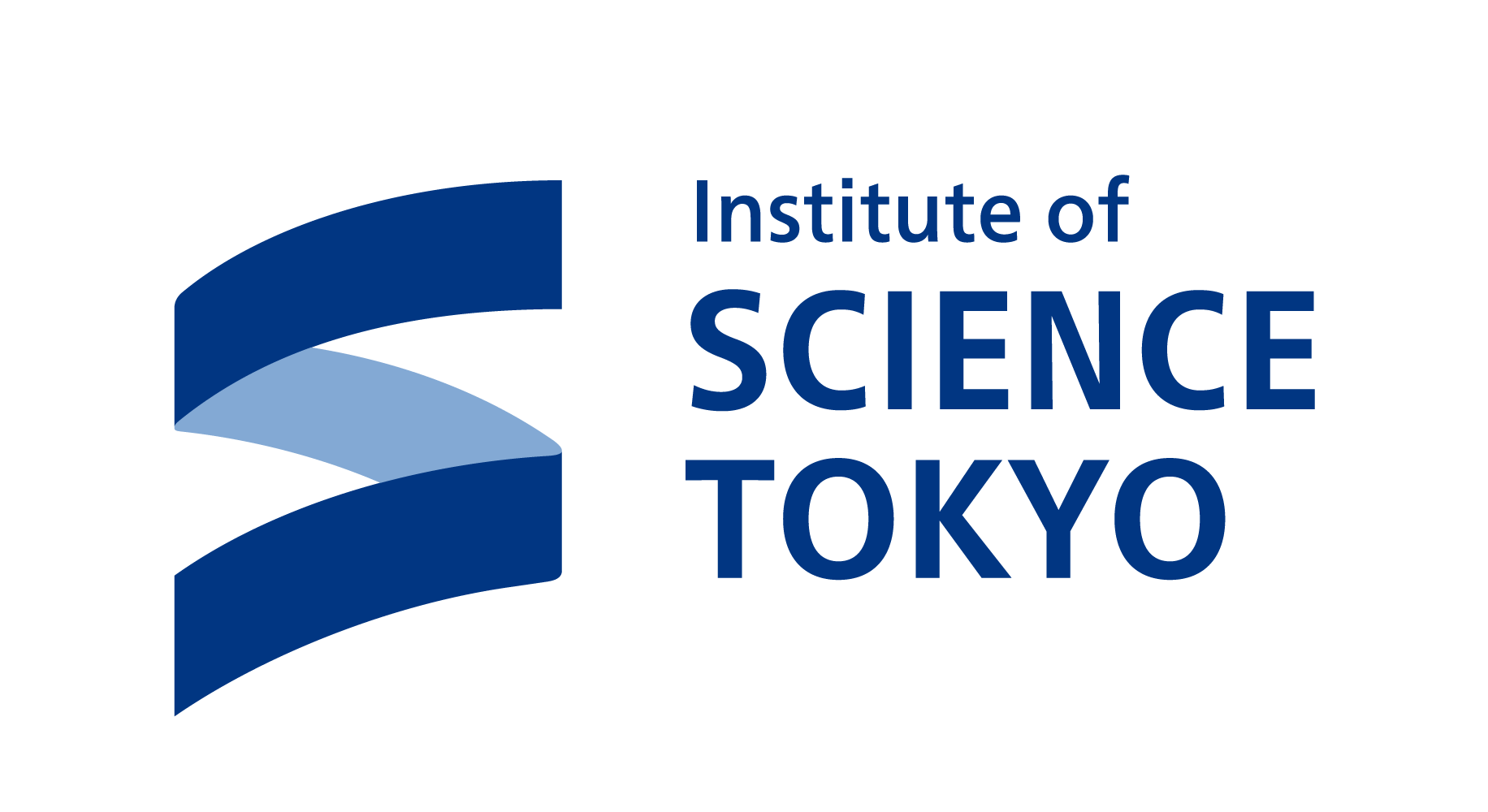
Research
研究概要 / Research Outline

本研究室で取り組んでいる研究テーマを紹介します。大きく分けて3つのテーマがあります。「テーマ1.水環境評価技術」では、水環境を構成する水質や生態系の健全性を評価する新たな技術を開発し、豊かな流域、水・物質循環を可能とする国土利用を提言することを目的とします。「テーマ2.水処理技術」では、環境やエネルギー負荷の少ない水処理技術の開発を通して、先進国や途上国における持続可能な水利用の実現を目指します。「テーマ3.持続可能性評価」では、人新世(Anthropocene)で人類が直面している課題である「持続可能な社会への移行」が達成できるよう、あらゆる分野を統合した学際融合研究を推進しています。以下に、各テーマにおける具体的な研究課題について説明します。
The following are some of the research themes we are working on in our laboratory. There are three main themes. “Theme 1: Water Environment Assessment Technology” aims to develop new technologies for assessing the health of water quality and ecosystems that comprise the water environment, and to propose the use of national land use that enable sustainable watershed as well as water and material cycles. “Theme 2: Water treatment technologies” aims to achieve sustainable water use in developed and developing countries through the development of water treatment technologies with low environmental and energy impacts. “Theme 3: Sustainability Assessment” promotes interdisciplinary research that integrates all possible disciplines in order to achieve a “transition to a sustainable society”, which is an issue facing humanity in the Anthropocene Era. The specific research topics in each theme are described below.
研究テーマ1「水環境評価技術」/ Research Theme 1: Water Environment Assessment Technology

従来から、有機汚濁負荷や富栄養化、放射性物質汚染など、途上国や先進国において様々な水環境汚染が明らかにされてきました。近年では、さらに貧栄養化や微量有機物汚染、有機フッ素化合物 (PFAS)、マイクロプラスチック汚染などの実態も明らかにされつつあります。本研究テーマでは、水環境を構成する水質や生態系の健全性を評価する新たな技術を開発し、流域水・物質動態や汚染実態を明らかにするとともに、望ましい循環を可能とする流域国土利用を提言します。ここでは、「物質循環を基礎とした健全で持続可能な流域水質の創出」と「1分子レベルで多様な有機物質を網羅的に検出する技術の開発」などについて紹介します。
Various kinds of water environmental pollution, such as organic pollutant load, eutrophication, and radioactive pollution, have been revealed in developing and developed countries. In recent years, the actual conditions of oligotrophication, trace organic matters and organo-fluorine compounds (i.e., PFAS) contamination, as well as microplastic pollution have also been revealed. This research theme aims to develop new technologies to assess the health of the water quality and ecosystems that comprise the aquatic environment, to clarify the dynamics of pollutants and actual state of pollution in the basin, and to propose the use of the national land use to achieve the desired cycle possible. Here, we will introduce “Creation of healthy and sustainable water environment based on elemental cycle” and “development of technology for the comprehensive detection of various organic matters at the single molecule level”.
- 超高精度質量分析を活用した処理水ならびに環境水中での溶存有機物質・化学物質の特性評価 / Characterization of dissolved organic matter and emerging chemicals in treated and natural waters using ultra-high precision mass spectrometry
- 超高分解能質量分析と機械学習を用いた消毒副生成物の形成機構と前駆体NOM分子組成の予測 / Formation mechanism of disinfection by-products and prediction of precursor NOM molecular composition using ultra-high resolution mass spectrometry and machine learning
- 1分子レベルで多様な有機物・化学物質を網羅的に検出する技術の開発 / Development of technology for comprehensive detection of various organic matters and chemicals at the single-molecule level
- 物質循環を基礎とした健全で持続可能な流域環境の創出: 鉄やセシウムなどの微量元素動態 / Creation of healthy and sustainable water environment based on elemental cycles: Trace element dynamics such as iron and cesium
- New topic be added soon
研究テーマ2「水処理技術」/ Research Theme 2: Water Treatment Technology

安心安全な飲料水を提供し、環境負荷のないよう下水を処理することは、水インフラの重要な社会的責任です。一方で、下水からの資源・エネルギー・流域情報の回収は、水インフラに付加価値をもたらします。このような視点に着目し、環境やエネルギー負荷の少ない水処理技術の開発を通して、先進国や途上国における持続可能な水利用を実現します。ここでは、「ナノ材料を活用した革新的嫌気性消化技術の開発」や「水処理系での汚染物質の反応に関わる理論モデルの構築」などについて紹介します。近年では、有機フッ素化合物の除去技術に関する研究にも取り組んでいます。
Providing safe and secure drinking water and treating wastewater in a way that does not impact the environment is an important social responsibility of water infrastructure. On the other hand, the recovery of resource, energy, and basin information from sewage brings added value to water infrastructure. Focusing on these perspectives, we aim to achieve sustainable water use in developed and developing countries through the development of water treatment technologies that have a low environmental and energy burden. Here, we introduce the development of theoretical models for the reaction of pollutants in water treatment systems and innovative anaerobic digestion technology using nanomaterials. In recent years, we have also been working on the removal technology development for the organo-fluorine compound (i.e., PFAS).
- 炭素材(修飾活性炭、カーボンフォーム等)やナノ材料(光触媒等)を用いた新規水処理技術の開発 / Development of Novel water treatment technology using carbon material (modified activated carbon, carbon foam etc) and nanomaterials (photocatalysis etc)
- ナノ材料を活用した革新的嫌気性消化技術の開発 & 環境微生物キーストーン種の推定 / Development of innovative anaerobic digestion technology using nanomaterials & Estimation of keystone species in environmental microbiota
- 水処理系での汚染物質の反応予測・評価のための理論モデルの構築: 量子化学計算と分子動力学シミュレーション / Development of a theoretical model for predicting reaction pathway of contaminants in water treatment systems: Quantum chemical calculation and molecular dynamic simulation
- 機能性ナノ材料を活用したハイブリッド太陽熱蒸留による海水淡水化技術の開発 / Development of Seawater Desalination Technology by Hybrid Solar Distillation Using Functional Nanomaterials
研究テーマ3「持続可能性評価」/ Research Theme 3: Sustainability Assessment

人新世(Anthropocene)で人類が直面している課題である「持続可能な社会への移行」が達成できるよう、あらゆる分野を統合した学際融合研究を推進しています。
We promote interdisciplinary research that integrates all possible disciplines in order to achieve the challenges for humanity in the Anthropocene: i.e., the transition to a sustainable society.

